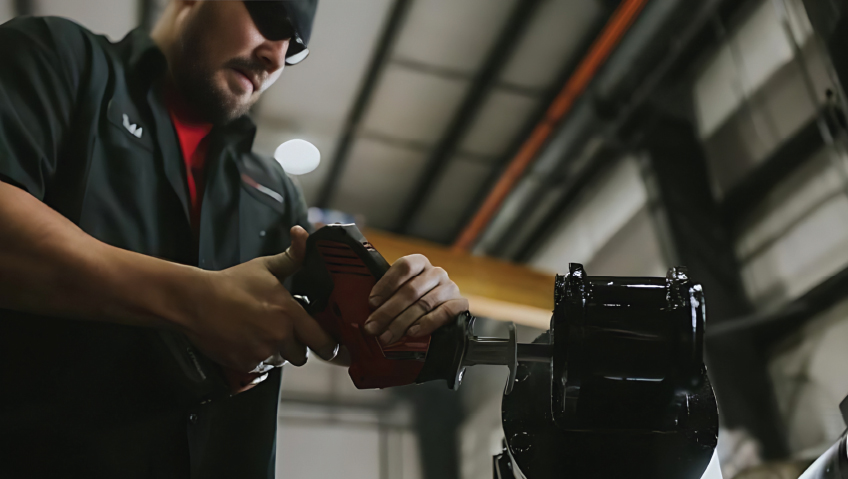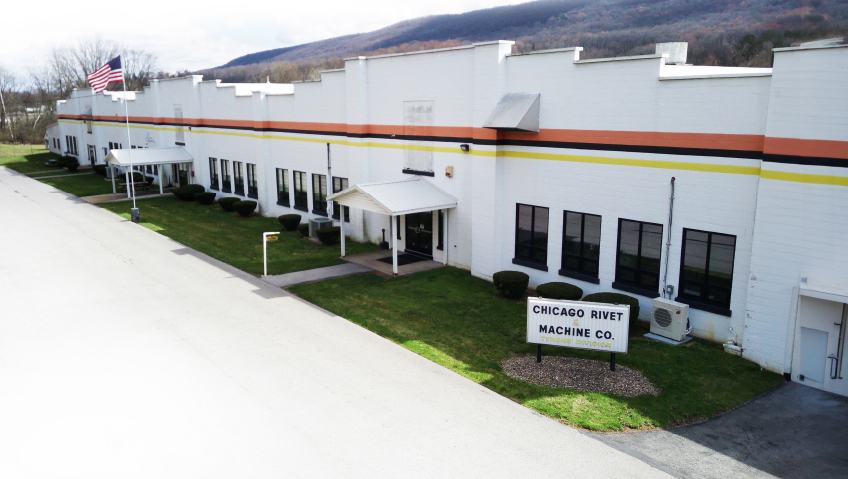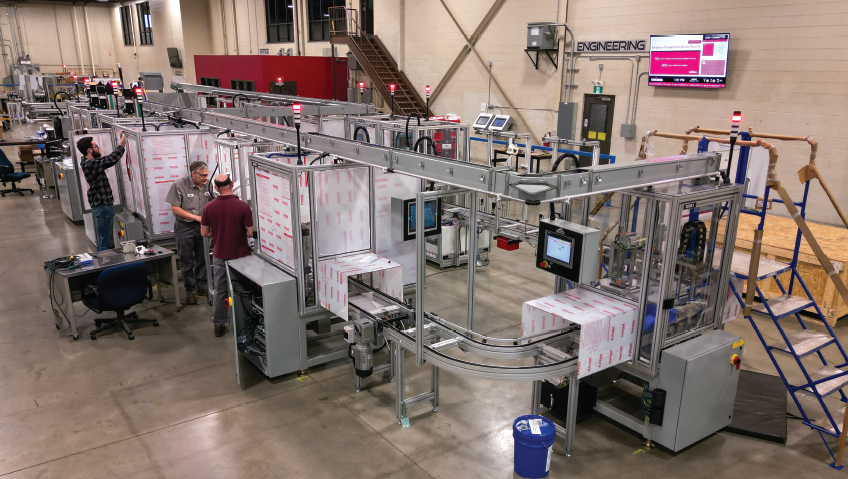The Innovative Manufacturers’ Center (IMC) is a public-private partnership working to increase the innovation, productivity, and profitable growth of Central Pennsylvania’s manufacturing community. The Center’s team of expert advisors strategically partner with the region’s small-to-medium sized manufacturers to deliver a wide range of services and resources at an affordable cost.
Supporting manufacturers
“We serve our clients in a number of ways,” says President Dennis Gilbert. Consulting is one major area of support. This might be in the form of project management or in helping manufacturers meet industry standards and regulations. Whatever the need, IMC boasts the expertise for tackling industry-specific challenges unique to manufacturing.
The team can tailor a solution to meet an individual manufacturer’s specific concerns. “Part of our process is interviewing them to determine where they are, the current state, and where they want to go,” says Business Advisor Tim Davis. Then, the team will determine “how our offerings line up with that.”
IMC offers a variety of training services, “whether individualized or small group training, to much larger implementations of training. That might be a 200-employee company, where we retrain 80 or 100 of them,” Gilbert says.
“Our flagship programs are largely in the area of Lean manufacturing, or what you might call continuous improvement,” he explains. Lean Manufacturing Level 1 and Lean Manufacturing Level 2 are offered every spring and fall. Each program consists of eight sessions, held every other week.
“Those are big programs for us,” he says. “We do a lot with those. We also do what is often called soft skills or essential skills training.” These classes cover skills “that are connected to developing supervisors, developing plant floor leaders.” The Center also offers higher level training, including for C suite employees. Other programs cover ISO, OSHA, and safety training, as well as IT and cybersecurity support. “We have subject matter experts in-house and third parties that we work with on various topics when we need to,” says Business Advisor Rick Terry.
The team can also assist in HR matters. “We help companies think about succession planning, competency requirements for job roles, things like that,” says Gilbert. “A lot of small to midsized manufacturers—which is our entire marketplace—they are looking for how they can onboard the right leaders in their team. Sometimes that might be in family-owned businesses—it might be the mother, father, grandmother, or grandfather leading the business. And then they’re trying to exit the business, but they want to have the business go on to succeed. They sometimes have children, grandchildren that might be interested, and sometimes they don’t. So, there’s a lot of work around succession.”
Lean manufacturing
“In very general terms, [Lean manufacturing] provides a system that companies can use as a guide to make themselves better, to improve in all areas,” says Terry. “It [involves] determining your current state and then your future state of where you want to be, and sets a direction to start making changes to get there. It doesn’t mean every change results in a positive result,” but every result is evaluated to determine the next step of improvement. “You’re continuously trying to move toward that level you want to be at.”
Lean manufacturing requires everyone’s input and participation. “The process itself works on engaging folks in an organization at all levels,” Terry says. “You need that top leadership… but you also need the folks that work on the floor in that organization. A lot of times, they are the subject matter experts in their area, and you need that information in order to assess both the current and future state of where you want to be. I think that’s a good thing about Lean manufacturing; in order to work and to be successful, you need to engage everybody.”
Training and guiding manufacturers in the principles of Lean is a key IMC goal. “Our Lean program is very thorough and broad,” says Davis. “Lean itself is really [about] identifying and eliminating waste. So our program is heavy on teaching people to be able to see what is waste, what is value added, what is not value added within their own work environment. We’re really working on teaching people to fish instead of handing them fish. And so the people who are doing the work get trained on how to recognize waste, good flow, quality, and value within their own work environments, and then are able to work on the problems themselves.”
Success stories
Diamondback Automotive Accessories, Inc. is an excellent example of a business utilizing IMC’s services to achieve continuous improvement. The Philipsburg, Pennsylvania-based company manufactures load-bearing pickup truck covers and accessories, primarily for outdoor enthusiasts. The business was experiencing rapid growth—25 percent growth in 2020 followed by 45 percent growth in 2021.
But, along with this impressive expansion came a new challenge, picking the correct parts for shipment.
To solve the problem, IMC’s Continuous Improvement team led an effort that included onsite guidance to reduce picking errors, and off-site coaching utilizing a number of Lean tools such as A3 thinking, PDCA cycles, DMAIC projects, FEMAs, and Coaching Katas.
This effort improved manufacturing communications, enhanced data visualization, deployed new equipment, improved labeling, and changed or improved processes. Within one year, picking errors dropped from 2.29 percent to 1.29 percent. Now, the company is all set to achieve their next target goal, which is an error rate of under 1 percent.
Another success story showcases IMC’s IT expertise. NuVisions Center works to improve the lives of people with vision, physical, or mental impairments and educates the public about vision loss. The Lewistown, Pennsylvania-based organization currently employs 44 people with disabilities across various industries. In order to keep an existing employment contract, the organization needed to achieve a higher level of cybersecurity. Compliance requirements for government contracting can be challenging for small companies with limited resources, especially since these requirements continue to evolve. NuVisions Center did not have in-house IT support, making it even more difficult for them to meet the new requirements.
IMC provided professional assistance, guiding the company through the process every step of the way. As a result, NuVisions Center successfully achieved the new cybersecurity requirements, saving an employee contract and retaining three jobs for their workforce.
Looking ahead
Going forward, “we have a lot of plans,” says Gilbert. A key goal is to reach more manufacturers and increase IMC’s impact within the communities served. “Manufacturing is a very important sector to Pennsylvania,” he points out. “So, some of our goals are not financial per se, but more about the impact that we create by helping companies, helping manufacturers, and then also from our own internal outlook, how can we deepen not only that impact, but our penetration?”
The team has determined that “six months ago, we were at about a 40 percent penetration rate, and now we’re at about a 55 percent penetration rate,” Gilbert shares. “[This is] measuring, of course, that we’re reaching more people, we’re talking to more people, we’re giving more and more people advice and training.”
Already an important pillar of support for Central Pennsylvania’s manufacturers, IMC is well positioned to broaden its reach. With a dedicated team ready to offer expert guidance, training, and more, the Center is sure to help many more manufacturers and communities enjoy a bright future.






